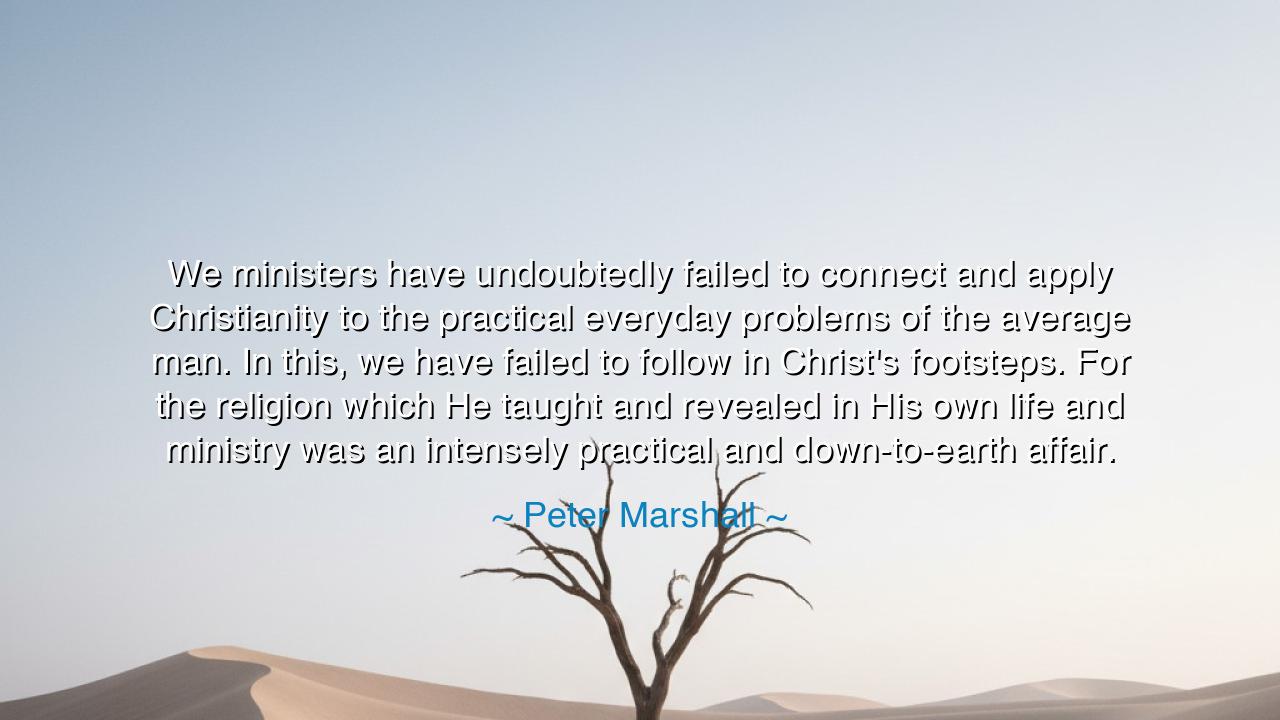
We ministers have undoubtedly failed to connect and apply
We ministers have undoubtedly failed to connect and apply Christianity to the practical everyday problems of the average man. In this, we have failed to follow in Christ's footsteps. For the religion which He taught and revealed in His own life and ministry was an intensely practical and down-to-earth affair.






Hear now, O seekers of wisdom, the words of Peter Marshall, who speaks with both humility and conviction: "We ministers have undoubtedly failed to connect and apply Christianity to the practical everyday problems of the average man. In this, we have failed to follow in Christ's footsteps. For the religion which He taught and revealed in His own life and ministry was an intensely practical and down-to-earth affair." These words are a lament, a call to reflect upon the way Christianity has often been presented in the world, far removed from the real-life struggles of the common man. They remind us that Christ’s message was not one of lofty ideals or abstract doctrines, but a living and breathing guide to confronting the daily challenges of life with love, compassion, and practicality.
In the time of Christ, religion was not confined to church buildings or rituals performed in isolation from the world. Jesus of Nazareth did not preach religion as an esoteric escape from the earthly struggle, but as the means to engage fully with the challenges of human existence. His ministry was deeply connected to the lives of the people, especially the poor, the sick, and the marginalized. Christ's actions—healing the sick, feeding the hungry, and offering forgiveness to the outcasts—were grounded in the real, tangible needs of the world around Him. He embraced life in all its messiness, showing that true religion is not an abstract set of beliefs but a practical force that transforms lives, relationships, and societies.
Consider the story of the Good Samaritan, one of Christ’s most well-known parables. In this tale, a man is left beaten and half-dead on the side of the road. While religious leaders pass by, it is the Samaritan—a figure despised by the people of the time—who stops to help, offering not only his compassion but his time and resources. This parable exemplifies what Christ taught: that true religion is not about following rigid rules or about ritual observance, but about being practically present in the lives of others, showing mercy, and offering tangible help. Christ's teaching was never abstract; it was always about how we live and act in the world, and how we serve the needs of others, especially those most in need.
Throughout history, there have been those who have followed in Christ’s footsteps, making religion not a tool of power, but a force for good in the world. Mother Teresa, for example, dedicated her life to serving the poorest of the poor in the streets of Calcutta. Her work was not just religious in the sense of ritual observance, but in the practical way she embodied the love and compassion Christ taught. She acted, taking the teachings of Christianity to the most vulnerable, caring for the sick, the dying, and the destitute. Mother Teresa’s life reminds us that true faith is not about grand gestures but about daily acts of kindness and service—real, down-to-earth actions that address the suffering of others.
Yet, in the modern world, Christianity has often become disconnected from these practical realities. Too often, the church and its ministers focus on doctrines, theology, and rituals, neglecting the very practicalities that Christ emphasized—love, compassion, service to others. Peter Marshall’s words are a challenge to the church of today: to return to the roots of Christianity, where faith is not merely a belief system, but a way of living. A faith that reaches into the suffering and joys of everyday life, a faith that moves beyond the walls of the church and into the lives of the people.
Thus, O seekers, the lesson is clear: Christianity is not a religion of abstract ideals, but one of practical action, rooted in the lives of everyday people. As Christ showed through His life, true faith is not just about believing in something, but about living according to that belief in service, compassion, and justice. When we feed the hungry, care for the sick, and show kindness to the marginalized, we are embodying the very spirit of Christianity. True religion is not about perfection or ritual; it is about living with integrity, being present in the lives of others, and offering love and compassion where it is most needed.
So, O seekers, let us remember that religion is not something we observe from a distance; it is something we live with every breath, every action, and every word. Let us not shy away from the practical work that Christ calls us to do, for it is in these acts of service that we find the deepest connection to the divine. Let our faith be rooted not in what we believe, but in how we live that belief, in how we show up for others, and in how we bring the teachings of Christ into the world in real, meaningful ways.






AAdministratorAdministrator
Welcome, honored guests. Please leave a comment, we will respond soon